| Srl | Item |
| 1 |
ID:
188080


|
|
|
|
|
| Summary/Abstract |
Violent radicalization is a complex process that results from multiple influences and experiences across the settings and contexts of an individual’s life. No single pathway or characteristic determines who is at risk for it. Given this understanding, no single intervention aimed at this multiply-determined problem is likely to be successful if it is implemented in isolation. Multidisciplinary team approaches are increasingly seen as holding promise in the prevention and intervention of violent radicalization in the United States and internationally. A multidisciplinary team is typically a group of professionals who are members of different fields of study (psychology, medicine, social work, etc.) who provide a specific service to an individual. Team members independently focus on the issues in which they specialize and activities of the team are coordinated with a common goal. This paper aims to extend current knowledge by addressing questions related to challenges in implementing a multidisciplinary team approach with the capacity to address violent radicalization, presenting potential solutions to these challenges as well as highlighting one multidisciplinary team, Community Connect, that successfully worked with youth identified as being at risk for violence.
|
|
|
|
|
|
|
|
|
|
|
|
|
|
|
|
| 2 |
ID:
129579


|
|
|
|
|
| Publication |
2014.
|
| Summary/Abstract |
This article questions the effectiveness of EU efforts to prevent terrorism and violent radicalization as well as the future prospects of such efforts. Driven by the pressure of attacks, member states have agreed on a comprehensive strategy to prevent radicalization and recruitment into terrorism, but simultaneously the strategy traces the limits of EU authority in member states in this regard. Meanwhile, the European Commission has focused on indirect measures, such as research support, for counter radicalization. However, over time, both flexible cooperation among a subset of member states and new EU initiatives have generated only few or biased policy outputs. The Stockholm Programme renewed the ambition to prevent terrorism at an early stage and underlined the EU's role in evaluation and knowledge exchange. This article questions the resulting proposal to create a network of local or subnational actors for best practice exchange. The article argues that preventive counterterrorism relies on contentious scientific evidence and that authoritative evaluations remain tied to national policy-making. Finally, the EU Commission cannot mobilize sufficient resources to ensure that 'frontline' organizations, such as police services, implement new practices. Taken together, this limits the potential for depoliticizing multilevel governance approaches to terrorism prevention. The conclusions of this article raise further research questions on the use of knowledge and complex governance patterns in EU internal security.
|
|
|
|
|
|
|
|
|
|
|
|
|
|
|
|
| 3 |
ID:
098884


|
|
|
|
|
| Publication |
2010.
|
| Summary/Abstract |
When, why, and how do people living in a democracy become radicalized to the point of being willing to use or directly support the use of terrorist violence against fellow citizens? This question has been at the center of academic and public debate over the past years as terrorist attacks and foiled plots inspired by militant Islamism have grabbed European and American headlines. This article identifies and discusses empirical studies of radicalization and points to the strengths as well as the weaknesses characterizing these studies. The aim is to take stock of the current state of research within this field and to answer the question: From an empirical point of view, what is known and what is not known about radicalization connected to militant Islamism in Europe?
|
|
|
|
|
|
|
|
|
|
|
|
|
|
|
|